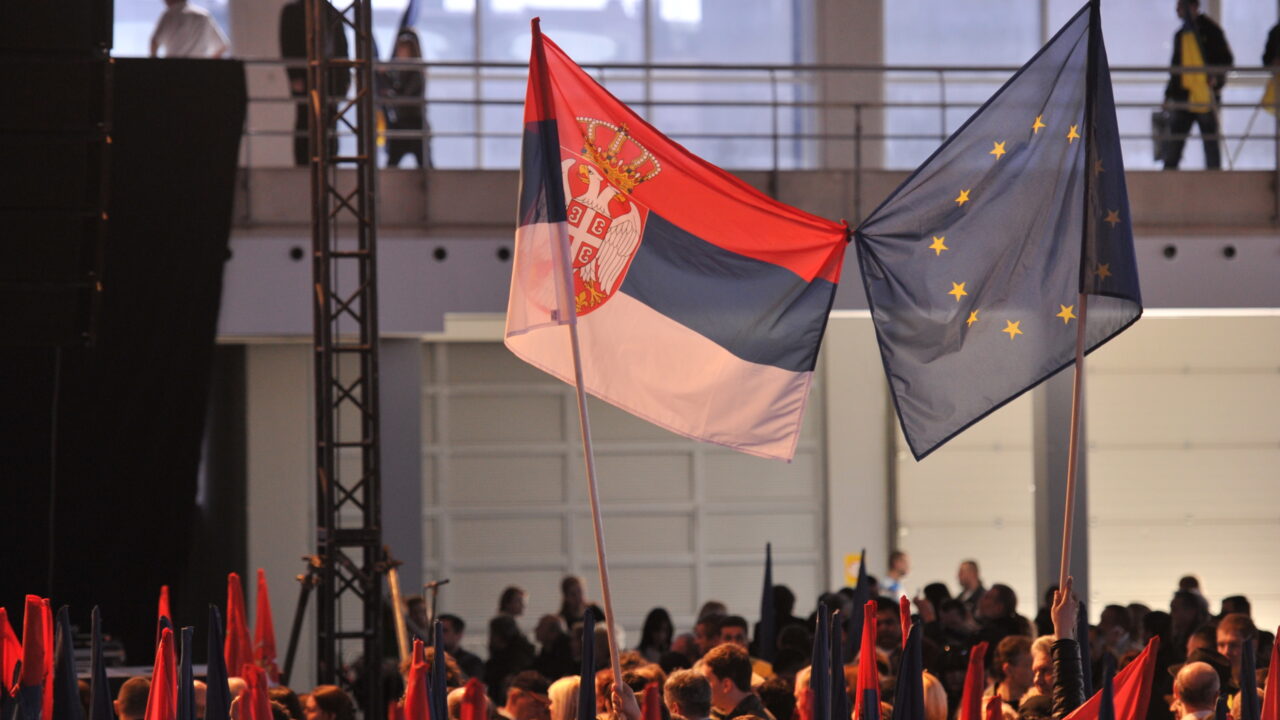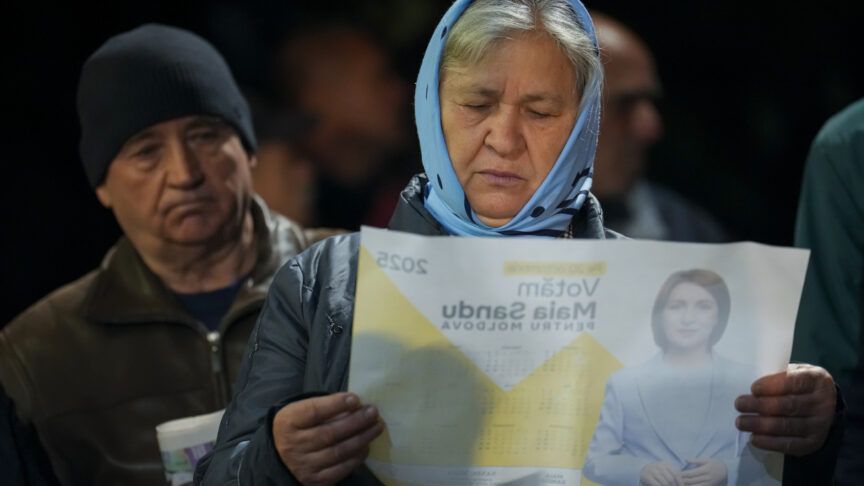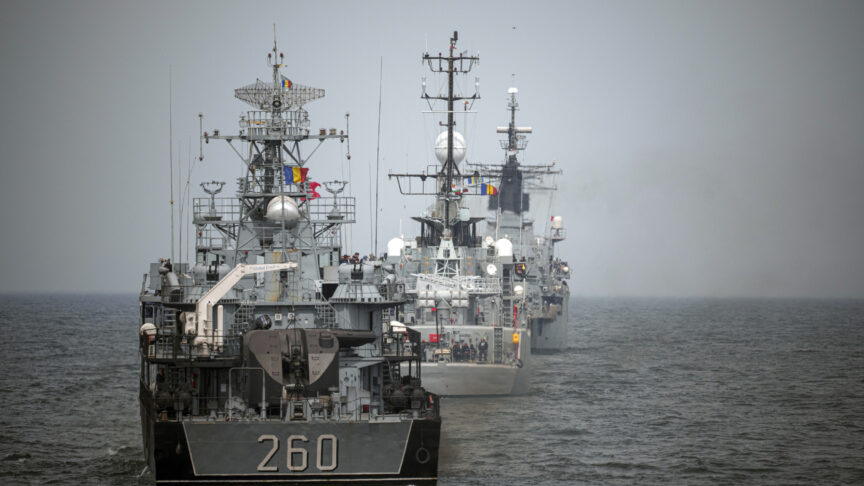Pandemic trends: Serbia looks east, Ukraine looks west
Public attitudes in Ukraine and Serbia raise pressing questions about EU enlargement. If member states are to sustain this process, they will need to base it on a shared sense of belonging
One of the biggest historic tasks facing the European Union in the twenty-first century has been to bring peace and European governance standards to a Western Balkans still dealing with the legacy of the Yugoslav wars, and to extract the bloc’s eastern neighbours from Russia’s ‘sphere of influence’. Having already added several central and eastern European countries as member states, the EU has reason to be confident that it will achieve these goals. But, judging by the strategic trajectories of Serbia and Ukraine, this will be far from easy.
In summer 2021, the European Council on Foreign Relations conducted its first public opinion polls in Serbia and Ukraine. The surveys were part of an attempt to understand how citizens there view the domestic and global fight against covid-19, the competence of the government, and their country’s geopolitical relationships.[1]
Both Serbia and Ukraine are immediate neighbours of the EU. The former is an EU candidate with strong links to Russia and China. The latter has no credible EU perspective and is at war with Russia. The pandemic-induced moods in the two countries are dramatically different, but both should concern the EU.
ECFR’s surveys show that people in Serbia have a strongly negative view of the union. They largely see the EU’s political system as broken and its response to the pandemic as incompetent. And they hold their own country’s leadership in higher esteem, while viewing Russia and China as key allies. In contrast, Ukrainians are overwhelmingly pro-European, want to build alliances with the West, and have faith in the EU system. Yet they have a strong sense that their allies have abandoned them, and little faith in their own political system.
Managing the pandemic
Both Serbia and Ukraine have been hit hard by the pandemic. According to official data, Serbia has so far experienced 7,129 deaths from covid-19 (820 deaths per million), while Ukraine has experienced 53,024deaths (1,220 deaths per million). The two countries have taken very different approaches to the management of the pandemic, especially when it comes to vaccine procurement. Early on, Serbia bet on Russian and Chinese vaccines to combat the virus. As Serbia administered its first Sputnik jabs, Ukraine legislated against even registering the Russian vaccine, citing national security. Kyiv did not want to depend on its enemy for essential vaccines; it was hoping for agreements with Western and Chinese pharmaceutical companies, and support from the COVAX programme. But these have been slow to materialise.
The quick start to Serbia’s vaccination programme prompted much self-congratulation from the country’s politicians: by January 2021, it had enough vaccines for the entire population –a claim that the EU, famously, could not make. Seven months later, however, Serbia’s efforts have slowed down. Only 41.75 per cent of Serbians have received at least one dose of the vaccine, compared to the EU average of 59.78 per cent. Ukraine, however, lags far behind, with only 8.6 per cent of the population having received at least one jab.
Survey data
ECFR’s surveys suggest that the relative success of Serbia’s vaccination scheme and alliances have strengthened people’s faith in their country’s political system and its geopolitical trajectory. In contrast, people in Ukraine are dissatisfied with their system and feel abandoned, even if they do see Western countries as key allies.
Despite the pandemic, two-thirds of people in Serbia see its political system as working well or very well. Moreover, most of them believe that their country is doing at least as well as other nations. Only 46 per cent of them say that the EU works well.
Meanwhile, Ukrainians have a very negative attitude towards their country’s political system: a staggering 70 per cent see it as broken. In keeping with this, Ukrainians feel their country is coping less well with covid-19 compared to the United States, China, Israel, the United Kingdom, and the EU (as specified in the survey). However, they believe that Russia is doing even worse. In contrast, their opinion of the EU political system is overwhelmingly positive: roughly two-thirds of them believe it works well.
Only 22 per cent of Ukrainians say that they can rely on the EU and the US in the recovery from covid-19, but they have even less faith in other powers. An overwhelming majority of them regard Western countries as either Ukraine’s allies or, more commonly, its necessary partners. In contrast, 67 per cent of Ukrainians view Russia as an adversary. Interestingly, 50 per cent of them see China as a partner, and 10 per cent view it as an ally.
The Serbian government’s geopolitical strategy has made alliances look very different in Serbia: 54 per cent of Serbians see Russia as an ally. If one adds those who see Russia as a necessary partner, an astounding 95 per cent of them view Russia as at least a necessary partner. Serbians have similar perceptions of China: 91 per cent see the country as either an ally or a necessary partner. The numbers are much worse for Western powers. Fifty-seven per cent of Serbians see the EU as a necessary partner, and only 11 per cent regard it as an ally. In no other European country that ECFR polled is there such a striking sympathy for Russia and China.
Ukrainians’ strong pro-Western instincts are also on display in their attitudes towards vaccines. Two-thirds of them say that they do not trust the Chinese vaccine – and more than 80 per cent that they do not trust the Russian one – while their trust in the US, UK, and EU vaccines is significantly higher (with an almost equal share of people trusting and not trusting each of these vaccines). In contrast, 75 per cent of Serbians trust Russia’s vaccine, and 68 per cent trust the Chinese one. The numbers for Western vaccines are much lower: 39 per cent for EU vaccines, 35 per cent for the US, and 29 per cent for the UK. Most Serbians do not trust Western vaccines.
It is disconcerting that, despite the strong pro-Western sentiments of Ukrainians, a plurality of them feel abandoned by the West: 34.4 per cent of them believe that their country can only rely on itself in the post-pandemic recovery, while just 22.3 per cent and 21.6 say per cent say that they can rely on the US and the EU respectively. Serbians feel much less alone: just 12 per cent believe that their country can only rely on itself. Thirty-eight per cent of Serbians say they rely on China, 28 per cent on Russia, and a meagre 13 per cent on the EU. Only 1 per cent believe they can rely on the US.
Serbians’ perceptions of Russia and China seem to be largely independent of their views of the EU – in that most sympathise with the two countries regardless of how they see the union’s political system. Predictably, those that see the EU political system as working are more likely to have confidence in Western vaccines (though still not to the same extent as the Russian or Chinese ones); they are also more likely to look to Europeans for support in the recovery from the pandemic (though not to the same extent as they do Russia or China). Forty-one per cent of Serbians see EU membership as positive, while just 30 per cent regard it as negative.
Vaccine geopolitics
In Ukraine and Serbia, choice of vaccines has become an indicator of geopolitical preferences. And, after Serbian President Aleksandar Vucic started distributing vaccine doses to neighbouring countries, the issue has become a symbol of Belgrade’s desire to reprise its Yugoslav-era role in the region. Around 40 per cent of Serbian respondents told ECFR that the “Serbian government did the right thing by sharing vaccines with neighbouring countries before all Serbians who wanted the vaccine got one, because that would enhance Serbia’s influence in the region”. Another 34 per cent felt that doing so was their moral obligation.
Last year, Vucic stated that “European solidarity does not exist. It was a nice fairy tale.” He followed this up by installing billboards in Belgrade with the message “Thank you, brother Xi”, in praise of Chinese President Xi Jinping. China used so-called ‘mask diplomacy’ in Belgrade to effectively undermine the EU’s soft power in Serbia and other countries in the Western Balkans, while Serbia took the opportunity to demonstrate its equidistance between Russia, China, and the West.
Multi-vector diplomacy, which fell out of fashion after the break-up of Yugoslavia and the advancement of EU accession, seems to be Serbia’s new development model. The bulk of Chinese investment in the Western Balkans – involving everything from the Bor copper mine to the Belgrade-Budapest railway and the Belgrade-south Adriatic highway – fill a glaring gap in investment. Serbia has invited Russia to build the Serbian section of TurkStream, an important pipeline for the transit of Russian gas. Gazprom is widely expected to commission a 200MW gas-fired power plant in Pancevo, built through NIS oil and gas company with Chinese equipment.
On the political front, Russia and China have reliably blocked concessions to Kosovo at the United Nations. Chinese facial recognition systems are deeply integrated into the Serbian interior ministry’s systems. And Vucic has adopted Russia’s erstwhile model of managed democracy and overcentralised governance.
Meanwhile, the EU has continued to support Western Balkans countries in their fight against the coronavirus, but most of these efforts have gone unnoticed by the public. Together with the European Investment Bank, the EU helped allocate more than €3.3 billion to support responses to the health crisis and its socioeconomic effects in the region. The union and its member states are some of the main donors to the COVAX initiative, which is due to supply more than 5 million vaccine doses to Western Balkan countries. On 20 April 2021, the European Commission announced that it would supply 651,000 doses of the BioNTech-Pfizer vaccine to the Western Balkans by August.
Vucic’s Titoist game of picking and choosing, of punching above one’s weight by playing each side against the other, sounds familiar and attractive to Serbian society
Ukraine and other Eastern Partnership countries are also covered by relief packages from the EU: so far, the bloc has allocated €3 billion to their recovery. Ukraine is scheduled to receive more than 4m vaccine doses from COVAX, including 2m donated by the US. Even if this is generous, it is far from enough for a population of more than 44 million. Needless to say, Ukraine has not been able to share any vaccines with other countries.
Vucic’s Titoist game of picking and choosing, of punching above one’s weight by playing each side against the other, sounds familiar and attractive to Serbian society. And, as during the cold war, the government in Belgrade uses this approach to suppress internal civil discontent and opposition to the regime.
Misguided enlargement policy
Many European countries are beginning to see light at the end of the covid-19 tunnel. But, two decades after the Yugoslav wars, the state of societies on the EU’s periphery raises pressing questions for the union: what can it do better to connect with people in the candidate countries such as Serbia – which, geopolitically, is drifting towards Russia and China? And how can the EU rethink its enlargement strategy to tap into Ukrainians’ pro-Western sentiments?
The enlargement process is fraught with difficulties, as most recently seen in the Bulgarian veto on the start of accession negotiations with North Macedonia. If member states are to sustain this demanding process in the long term, they will need to base it on a shared sense of belonging – which seems to be weakening in Serbia. The EU is a community of values. And European Commission President Ursula von der Leyen has pledged to work towards a more geopolitical union. So, what does it mean if a prime candidate for EU membership such as Serbia looks east rather than west and aligns itself with China and Russia?
Is it fair for the EU to offer membership to the increasingly anti-Western Serbia while denying this to Ukraine, where citizens have faith in the EU, look up to it, and hope for a future much closer to the West than to Russia?
How should the EU implement its new enlargement methodology – which involves a course correction to ensure accession is not inevitable when there is democratic backsliding in a candidate country – if states see the EU as not an ally but, at best, a necessary partner? The risk here would be that countries agreed to legal changes on paper but did not implement them in practice. Moreover, the EU’s tacit endorsement of Serbia’s geopolitical trajectory would help prop up an opportunistic regime that could serve as a model for others in the region.
In the previous waves of enlargement, the union could not claim all the credit for democratic progress in central and eastern Europe because most of the hard work was done by the countries themselves. But the EU did empower reformist politicians by approving their efforts and rewarding them with aid, trade, and political ties. The adoption of EU governance standards was crucial to the success of candidate countries. Today, the opposite logic seems to apply. The pro-European drive is no longer rewarded: a transactional, double-dealing approach can bring a state closer to EU integration and even enhance its regional influence.
[1] ECFR worked with Ipsos in Serbia and the Razumkov Centre in Ukraine, and interviewed 1,000 and 1,014 people respectively.
The European Council on Foreign Relations does not take collective positions. ECFR publications only represent the views of their individual authors.












